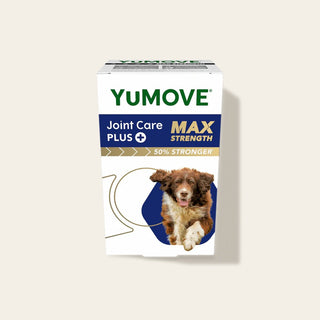
Health Guide Menu

Key steps to building a healthy future for your puppy
We know that your puppy's health is your priority. Giving your puppy the right care and attention early on will help to ensure they live a long and healthy life. The first few months play a crucial role in your puppy’s long-term growth, development and health.
Aside from the basics (vaccinations, worming, and tick-treatment) which your vet can provide professional assistance on, there are three key areas of puppy health that can make all the difference:
- Brain and eye development
- Digestive health
- Natural immunity
Focussing on these three key areas, we’ve put the following guide together to help you understand how nutrition can support your puppy’s health and development, along with the benefits of using puppy supplements.
Focus: Brain and eye development
Helping puppies to learn and train better
One of the key areas that affects your puppy’s ability to be trained, learn new tasks, and cope with the exciting world around them is their brain and eye development.
Omega 3 oils, in particular Docosahexanoic Acid (DHA for short), play a vital role in the proper development of your puppy’s brain and eye tissues.
Puppies develop about 70% of their brain by six weeks, and 90% of their adult brain by 12 weeks, so keeping this rapid growth well fed is very important. Supplementing your puppy’s diet with dog supplements with Omega 3 DHA has been shown to improve the puppy’s eyesight and their ability to learn new tasks.
In one study, puppies receiving higher levels of DHA before weaning (via the mother) and after weaning (via their puppy diet) significantly outperformed puppies fed with typical levels of this Omega 3. In fact, in a shape-recognition test, the success rate among puppies receiving enhanced DHA was twice that of those receiving typical levels of DHA in their diets.
The study results show that supplementing your puppy’s diet with DHA can help brain and eye development. This benefit can have positive knock-on effects such as better socialisation with other dogs and family, and the ability to grasp training and obedience challenges more quickly.
Focus: Digestive health
Promoting healthy digestion and growth

Nurturing healthy digestion is crucial. Your puppy is growing very quickly, and their digestive system is constantly developing so mustn’t be overloaded with large volumes of food. Feed little and often by dividing the daily amount of food into 3 or 4 portions given at regular intervals as guided on the pack. Their internal body clock will get the digestive juices flowing at dinnertime every day, so do your best to stick to a routine.
A puppy’s strong and healthy digestive system will ensure that they get all the nutrition they need out of their food, meaning they can grow and develop as well as possible.
Don’t be distressed if your pup suffers from an upset stomach as it’s quite common. This can be caused by overeating, the stress of moving to a new environment, or simply bugs that they’ve picked up from their surroundings. If there is a prolonged bout of illness or you are worried, always visit your vet to rule out more serious issues. It’s worth noting that when it comes to toilet time, a healthy digestive system can make clearing up after your puppy much easier too.
You can help your puppy’s digestive system by supporting the good bacteria in their gut with digestive supplements for dogs. The good bacteria plays an important role, keeping bad bacteria at bay, and producing nutrients that support your puppy’s health. One of the most visible benefits of having a healthy gut flora is that your puppy’s stools will be firmer, (rather than the soft or loose stools associated with digestive problems).
There is a special type of prebiotic called an Oligosaccharide, which helps to feed the good bacteria in your puppy’s gut. Oligosaccharides help to encourage good bacteria, promoting healthy digestion. They are also thought to help the special nutrient-absorbing structures in your puppy’s gut to develop properly, which increases their ability to absorb critical nutrients needed for healthy growth.
Focus: Natural immunity
Supporting your puppy’s immune system
The immune system is a network of specialised organs, tissues, cells, and chemicals. Dogs have various complex mechanisms to protect against pathogens, which range from physical barriers to specific immune defences.
When your puppy is born, they emerge from a safe, protected environment into the big wide world of pathogens and bugs. Puppies are born with what is called innate immunity, which consists of physical barriers such as mucous membranes to protect against entry of pathogens. However, if those physical barriers are overcome, an effective immune system is required to clear the infection.
At this ‘immature’ stage, their immune system is not fully functional, so they are more susceptible to infection. They often need assistance to thrive. In their first few weeks, this assistance comes from their mother, who transfers immune cells and immune components through her milk. In this way, looking after a puppy is much like looking after a child.
A puppy’s immune system can take up to five months to mature to its fully functional capacity. Whilst one of the riskiest stages is immediately after birth, some puppies also struggle immediately after weaning. This can be due to the puppy’s immature immune system being unable to cope with disease. Encouraging a stronger immune system as early as possible can help your puppy develop into a healthy adult dog.
Therefore, it is very important to ensure that your dog receives all their puppy vaccinations at the right time. Vaccination helps to ensure that your puppy is protected against some of the most dangerous diseases that could otherwise kill them.
Much of your puppy’s immune system is localised around their gut. The gut is one of the main areas of entry for pathogens into your puppy’s body, so it makes sense to have a lot of the defence systems built in there. The good news is that it’s easy to include components in your puppy’s diet that can help to support the development of this immune system.
Beta-glucans are thought to interact directly with the immune system in your puppy’s gut, helping to develop a natural immune response. Beta-glucans work by ‘mopping up’ bad bacteria such as E. coli, helping your puppy to get rid of these pathogens easily and quickly.
Protecting the immune system
As well as helping the immune system to develop, it is also important to ensure the developing immune system is well protected. Immune cells are especially susceptible to Free Radical damage because their cell membranes contain high levels of Polyunsaturated Fatty Acids, which are more easily damaged.
The natural anti-oxidant, Vitamin E, helps to dissolve these Free Radicals to protect the cells of the immune system.
Supplementing your puppy’s diet for ultimate health
You’ve now seen that your puppy’s diet can really affect their ongoing health, growth and development. You can use products like MultiVits for Young Dogs to provide key ingredients to support the important areas of your puppy’s health including digestion, immunity, and brain and eye development.
Do you have any hints and tips for taking care of a new puppy? We’d love to hear about how you and your new furry friend overcame the challenges of adapting to life together. Comment below and join our friendly pet-loving community on our Facebook and Instagram pages.





